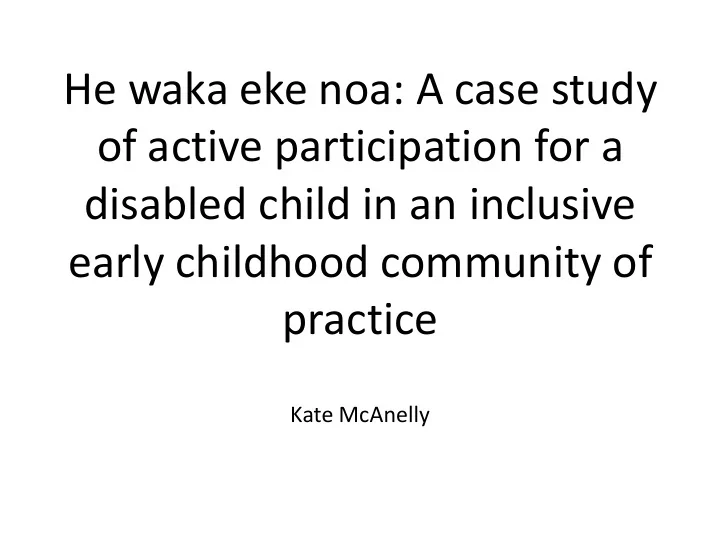

He waka eke noa: A case study of active participation for a disabled child in an inclusive early childhood community of practice Kate McAnelly
Introducing Me • Parent • Early childhood teacher • Proud NZEI Te Riu Roa member • Researcher
The genesis of my dissertation
The political context that often reinforces exclusion The status of ECE How the Education Act, NZDS, Te Whāriki , UNCROC, and UNCRPD are understood and enacted The government’s understanding of ‘participation’
Making sense of active participation Introducing Huakina Mai ( Mackey & Lockie, 2012) • Four layers of participation in early childhood settings – enrolment, attendance, participation, active participation • Active participation as being ecological, pedagogic, equitable and inclusive in nature
The Theory Disability Studies in Education (DSE) Communities of practice (Wenger) (image courtesy enhancementthemes.ac.uk) (image courtesy disability-studies.leeds.ac.uk)
Introducing the Project Ethnographic case study Finding my kindergarten and participants Transitioning from teacher to researcher
Active participation in action What does active participation look like in practice? Emergent themes
Image designed and supplied by Steve (Tama's Dad)
Summing things up o Answering my research question o What does my dissertation offer that’s new?
Where to from here? • Early childhood teaching • To PhD and beyond • Presenting and publishing (image courtesy keepcalm-o-matic.co.uk)
Key references Fielding, M. (2014). Democratic fellowship and the practice of human possibility. Retrieved from www.researchgate.net Mackey, G. & Lockie, C. (2012). Huakina mai: Opening doorways for children's participation within early childhood settings – Economic disadvantage as a barrier to citizenship. In D. Gordon-Burns, A. Gunn, K. Purdue & N. Surtees (Eds.), Te Aotūroa Tataki Inclusive early childhood education: Perspectives on inclusion, social justice and equity in Aotearoa New Zealand, pp. 75-93. Moss, P. (2007). Bringing politics into the nursery: Early childhood education as a democratic practice. Retrieved from www.researchgate.net Dahlberg, G. (2003). Pedagogy as loci of an ethics of an encounter. In M. Bloch (Ed.), Governing children, families and education: Restructuring the welfare state (p261-286). New York: Palgrave Macmillan. Fielding, M. (2016). Why and how schools might live democracy as an 'inclusive human order'. Retrieved from www.researchgate.net Moss, P. (2005). Early childhood institutions as loci of ethical and political practice. Retrieved from www.researchgate.net
Contacting me kate.mcanelly@postgrad.otago.ac.nz
Recommend
More recommend